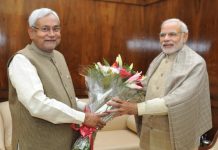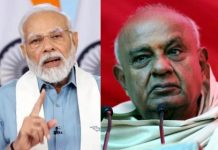A Tehelka SIT report reveals how middlemen, in collusion with corrupt officials, exploit the government’s slum rehabilitation scheme by illegally selling flats meant for the needy to affluent beneficiaries
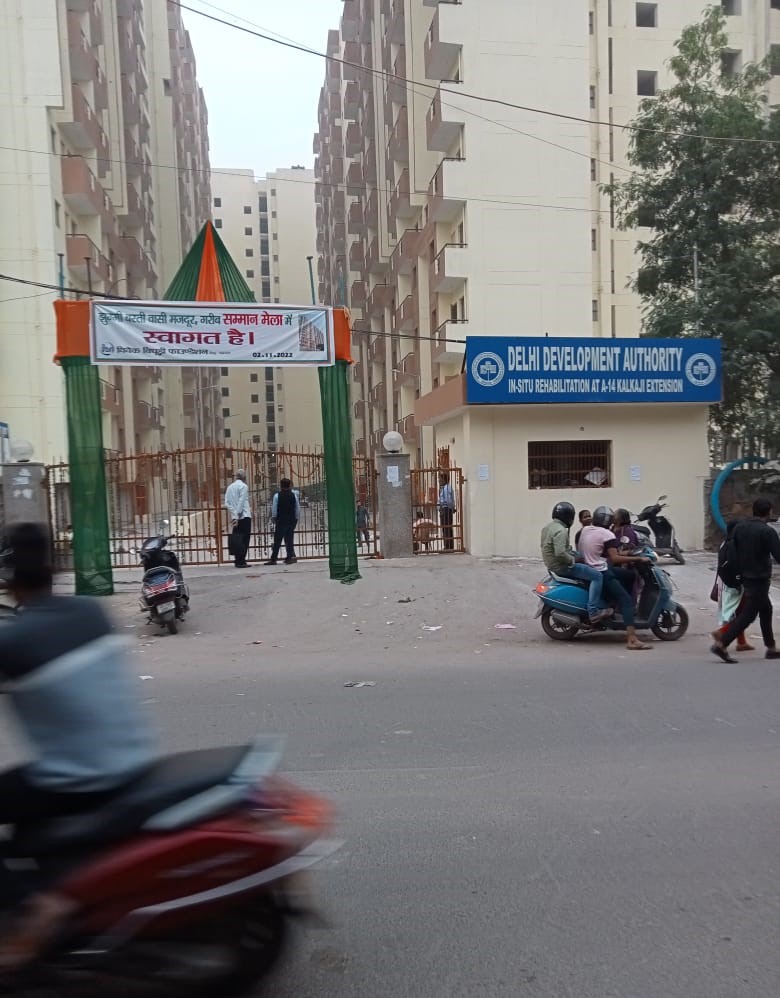
On 2nd November, 2022, Prime Minister Narendra Modi inaugurated over 3,000 flats for the rehabilitation of slum dwellers in Delhi’s Kalkaji Extension, under the Delhi Development Authority’s (DDA) “in situ slum rehabilitation project.” The Kalkaji Extension project, aimed at rehabilitating slum dwellers from Kalkaji’s Bhoomiheen Camp, Navjeevan Camp and Jawahar Camp, was conceptualized in 2011, with the foundation stone laid in 2013.
In the first phase, the DDA constructed 3,024 flats on a vacant commercial plot for those living in the Bhoomiheen Camp. However, just two years after the Prime Minister Modi inaugurated these flats, fraudsters have moved in and begun selling these flats, intended for slum dwellers, to the wealthy. These 25-square-metre, 14-story high-rise flats, which are not meant for sale, were to be provided to beneficiaries for only Rs 1.24 lakh each, with the remaining cost covered by the DDA. Despite this, middlemen are selling the flats to affluent buyers — most of whom already own homes in Delhi — for a bribe of Rs 6.50 lakh per flat, using fake slum addresses.
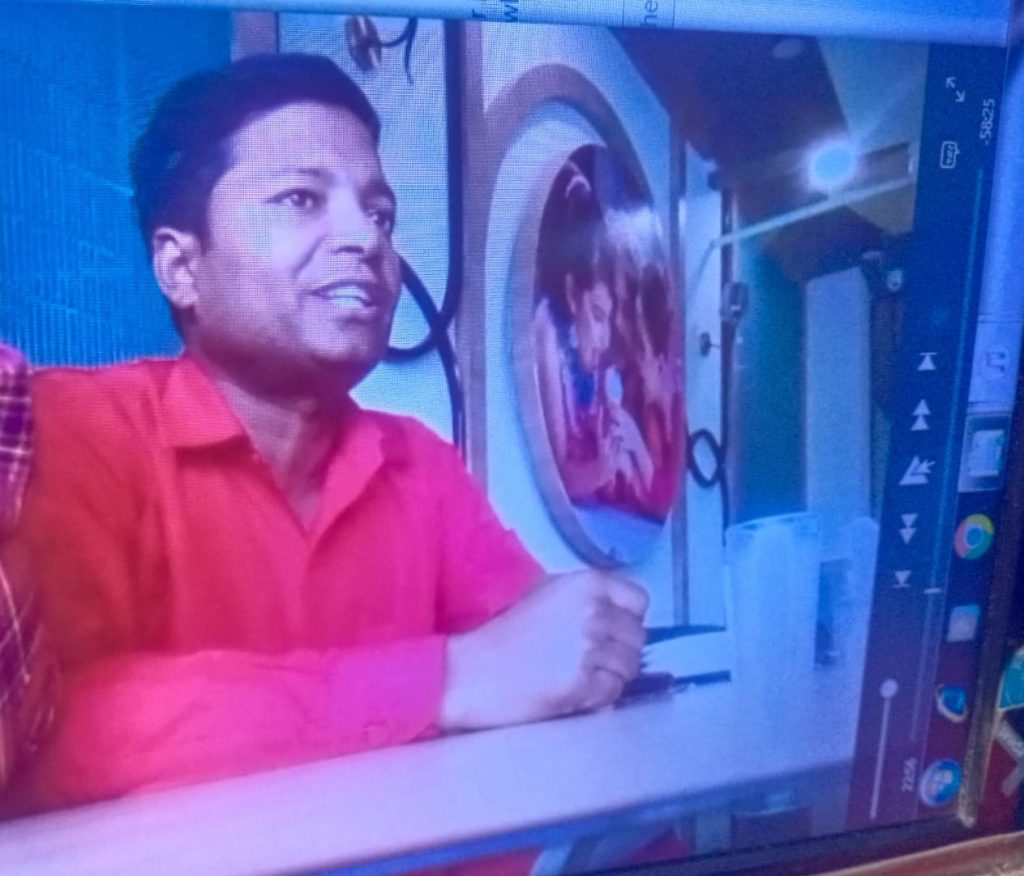
Investigations have revealed that middlemen have already duped many people with the promise of providing flats in this society meant for the homeless.
“These flats are meant for slum dwellers, but I will prepare documents showing that you were living in the slum before 2005. The government isn’t going to check, so no one will know you’re not from the slum. For one flat, we charge Rs 6.50 lakh, all paid in cash. This bribe is distributed from top to bottom within the authority. These flats cannot be sold, but you will get one once we show that you’re from the slum,” revealed Sanjay Kumar Pandit, a middleman, to Tehelka.
“I’ve already taken Rs 3 lakh as a bribe from a client. I need Rs 5.50 lakh more, and then he’ll receive the allotment letter for the flat. So far, I’ve sold 10 flats in this society to wealthy clients who aren’t from the slums. But through the fake documents we created, we made it appear they were,” said another middleman, Moinuddin Alvi.
“My client has paid the full amount of Rs 6.50 lakh as a bribe for one flat. He is a rich person, but I have proved – with the help of fake documents – that he belongs to the slum. He is waiting for his flat. The government cost of these flats is only Rs 1.47 lakh. The government officials have 25-30 flats in this society, which they are selling to the rich, who do not come from the slum area, by taking money,” said Sanjay Kumar Pandit.
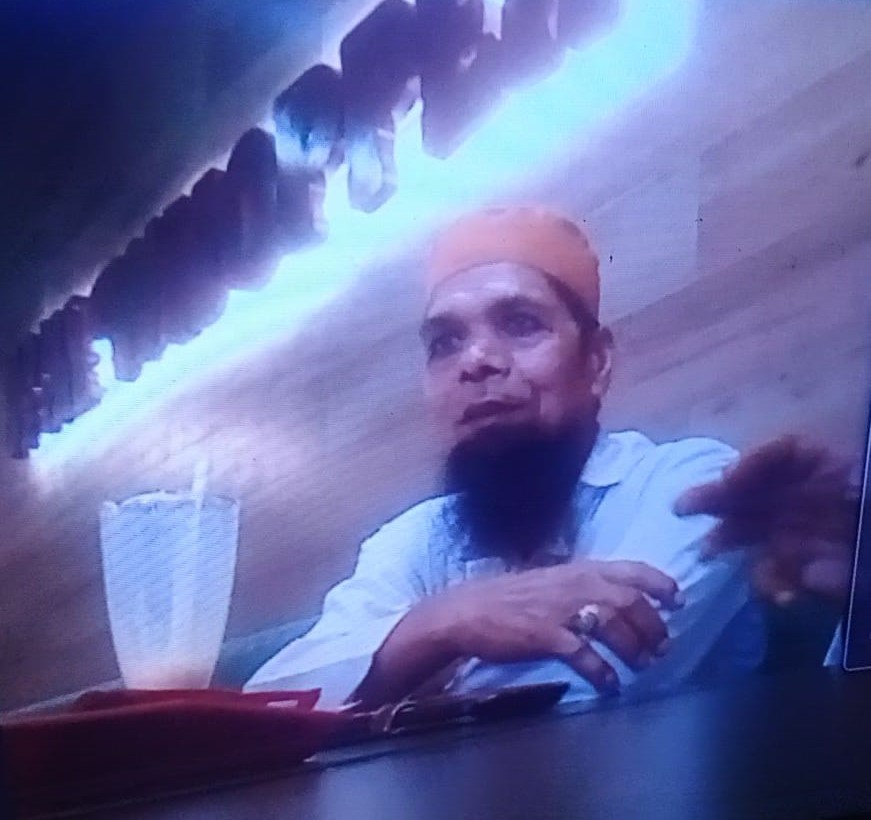
Ali Jaan, a retired government employee from Delhi’s Public Works Department (PWD), explains how he “fell into the middlemen’s trap”. Despite owning a house in Delhi and having no connection with the slums, he booked two flats in the society for Rs 13 lakh, paying Rs 3 lakh in advance. He was promised that he would receive the flats within three months. However, when the promised flats were not delivered even after the deadline, Ali realised he had been duped by the middlemen. He approached Tehelka, posing as a whistle-blower, to expose the nexus of brokers deceiving people by offering flats meant for slum dwellers.
“I booked two flats in the names of my wife and daughter and paid Rs 3 lakh in advance as a bribe. But when the flats weren’t delivered after the stipulated time, and the middlemen started asking for more money, I became suspicious that I had been duped. That’s when I decided to expose these culprits,” said Ali Jaan.
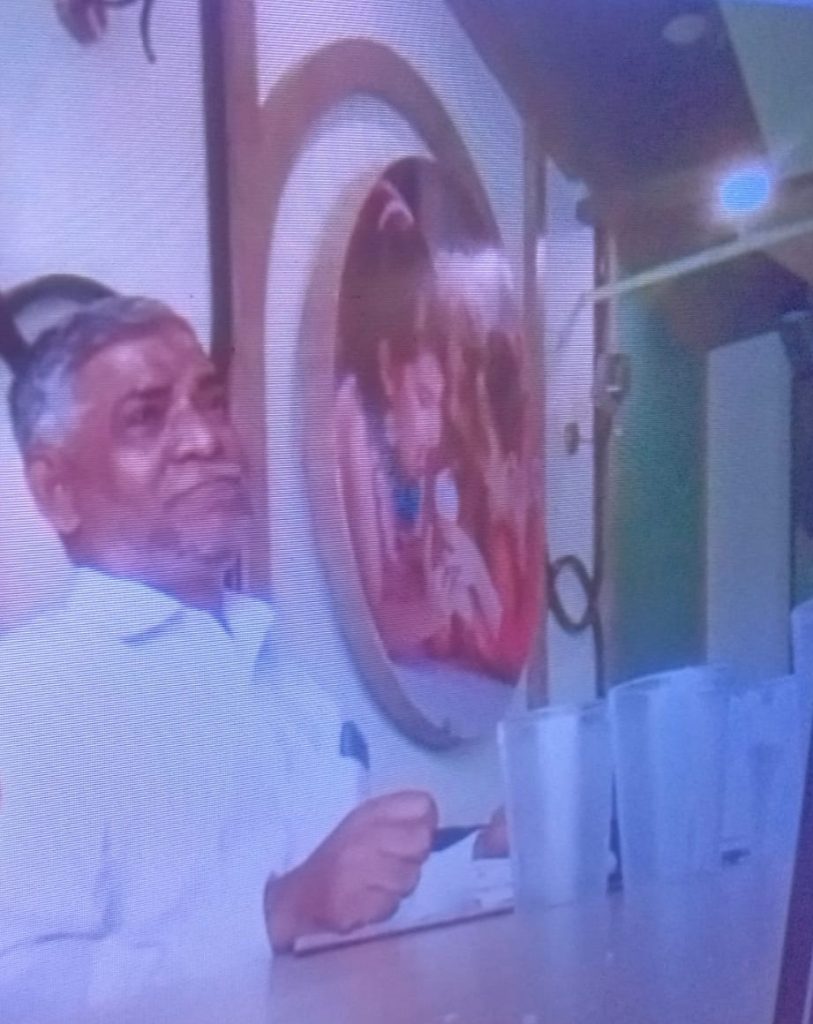
With Ali Jaan’s help, the first meeting with the brokers was organised in Noida. Ali introduced the Tehelka reporter as a businessman who would pay the remaining amount of bribe on Ali’s behalf for his flats. The two middlemen, Sanjay and Alvi, came for the meeting with our reporter. Sanjay admitted to the reporter that the flats were meant for the rehabilitation of residents from three slum clusters—Navjeevan, Bhoomiheen, and Jawahar camps in Kalkaji. He explained that he would fraudulently register Ali Jaan as a resident of the Navjeevan slum, allowing him to get a flat. Sanjay also confirmed that these flats were not for sale and that selling them was illegal. However, he claimed to know some government officials who held some flats and were willing to sell them to a select group of people they trusted. “That’s how we’re selling these flats for a price,” Sanjay explained.
Sanjay- Ye jo jhuggi jhopdi wale hain na?
Reporter- Jhuggi jhopdi walon ko basane ke liye?
Sanjay- Haan..ab unse zameen liya ja raha hai..
Sanjay (continues)- Ab hum jaankar log hain na PA ka.. hum kuch apne pass rakhtey hain, bahar nikal denge to kuch paisa ban jayega. To hum log unke saath judkar ke, unhone mere ko ye bola ke kuch khas log hon unko dila saktey ho, kyunki ye chezein sabke liye nahi hain.
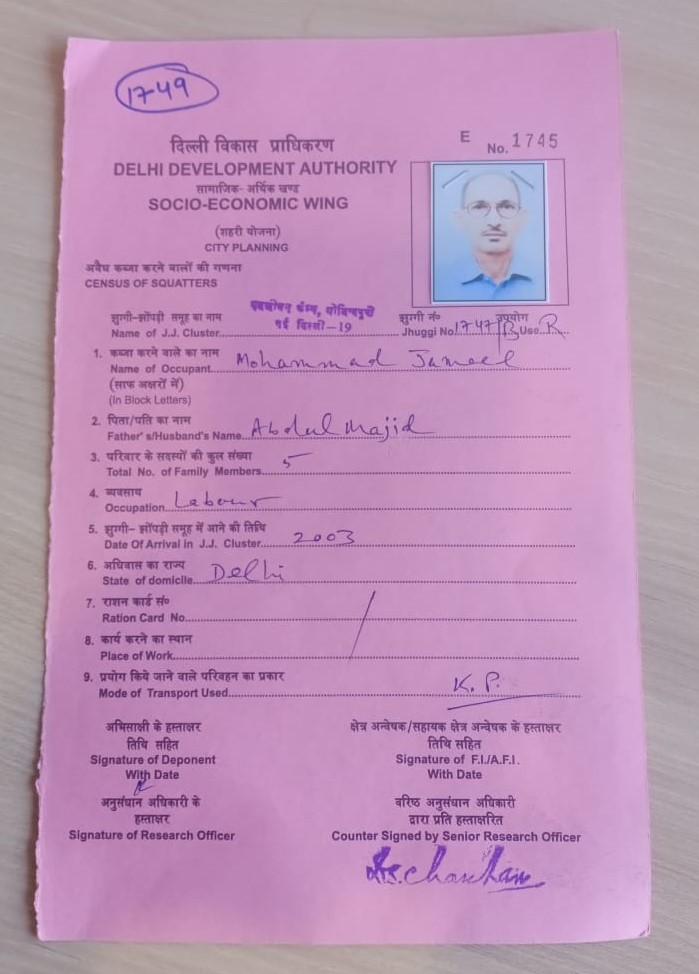
Reporter- Ye aapko kisney bola?
Sanjay- Jinke through hamara kaam ho raha hai.
Reporter- XXXX ke through ?
Sanjay- Haan XXXX ke through hamara kaam ho raha hain to unhone bola sabke liye nahi hai..kuch khas log ho, kyunki bechne ke liye nahi hai ye. Legal to hai nahi bechne ke liye, kuch khas log hon to unko hum kaam kara saktey hain to usi baat ka paisa hai..
Reporter- Accha…kyunki ye makaan bechney ke liye to hotey nahi hain.
Sanjay- Aur acchi baat ye hai ke inke naam se ho kar ke mil raha hai. Sabit karke diya ja raha hai ki inka bhi wahin khata hai..
Reporter- Matlab inka makaan wahan se toda ja raha hai.?
Sanjay- Jaise jo jhuggi jhopdi todi ja rahai hai na, usmein sabit karke milega ke inka bhi hai..
Reporter- Matlab Ali bhai ka bhi aap sabit karogey ki jhuggi jhopdi mein inka ghar tha?
Sanjay- Haan
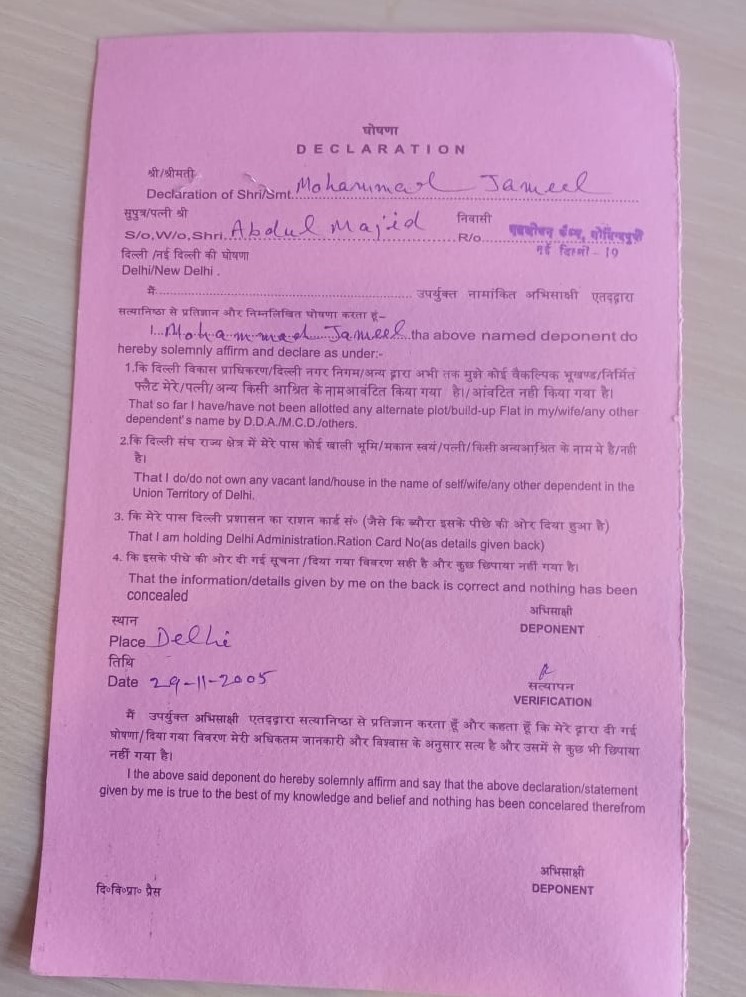
Reporter- Ye kaise kar dogey ghar to tha nahi hai inka.
Sanjay- Nahi tha na sir…abhi purana record chal raha hai.. 2005 ka record chal raha hai..to wo log apne record mein saabit karenge.
Reporter- Jhuggi jhopdi kaunsi hai jo todi gayi ?
Sanjay- Navjeevan camp ki abhi tootegi.
Reporter- Tooti nahi hai abhi, tootegi?
Sanjay- Haan tootegi..adha tooti hai, adha tootegi, ho to bahut pehle jata kaam, lekin un logon ne dharna daal diya, is chakker mein late ho gaya sara kaam.
Reporter- Inka kahan show karoge aap Navjeevan mein hi?
Sanjay- Navjeevan mein..
[In the meeting, the brokers revealed how they were fraudulently securing flats meant for slum dwellers by falsely registering wealthy clients as residents of the slums. This clearly shows how some government officials are involved in selling these flats illegally, exposing a nexus between the brokers and corrupt authorities.]
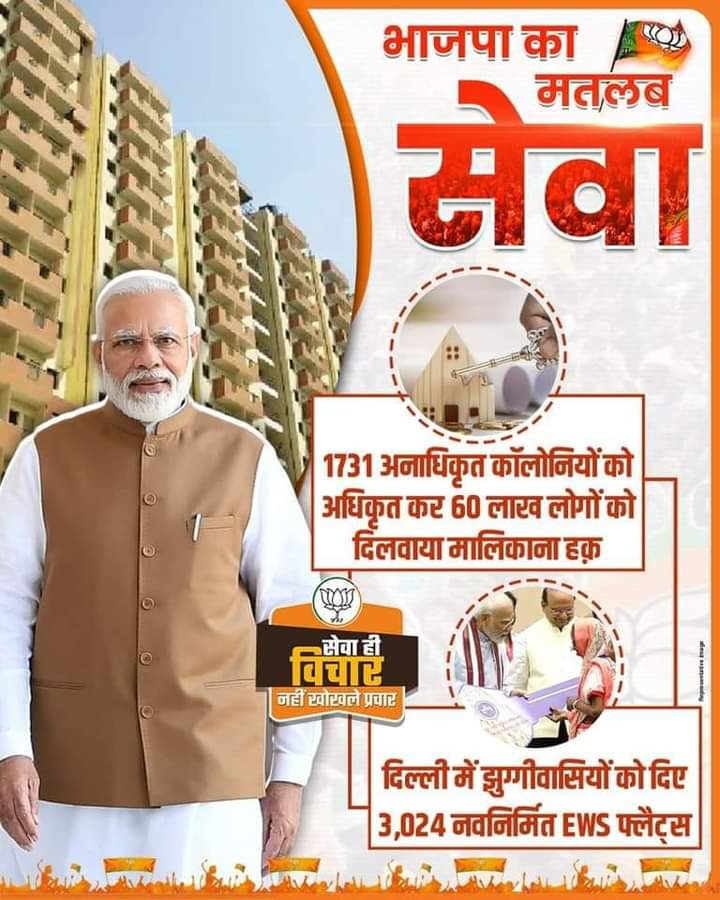
When asked how they would show me as a slum resident to make me eligible for the flat, Sanjay explained that, since I am a taxpayer and my financial records are in the official records, he would instead falsely register my brother or sister, who doesn’t pay tax or doesn’t pay as much as I do, as a slum resident to secure the flat.
Reporter- Aap mujhe jhuggi jhopdi wala kaise bata dogey.?
Sanjay- Aapko nahi… aapke family member ko.
Reporter- Mere family member ko bhi jhuggi jhopdi ka kaise sabit kar dogey.?
Sanjay- Jaise aapka ghar yahan pe hai, aapka koi bhai hai..behen hai, wo reh saktey hain.. wo to nahi bhar rahe hain tax itna, wo log itna nahi jitna aap bhar rahe ho tax, aur jhuggi jhopdi mein rehne wala tax nahi pay karta hai. Sab kuch possible hai, sir.
[The conversation reveals how the brokers navigate legal hurdles by registering family members with lower financial visibility as slum residents. It emerges that they exploit the fact that slum dwellers typically don’t pay taxes, allowing fraudulent eligibility for flats. ]
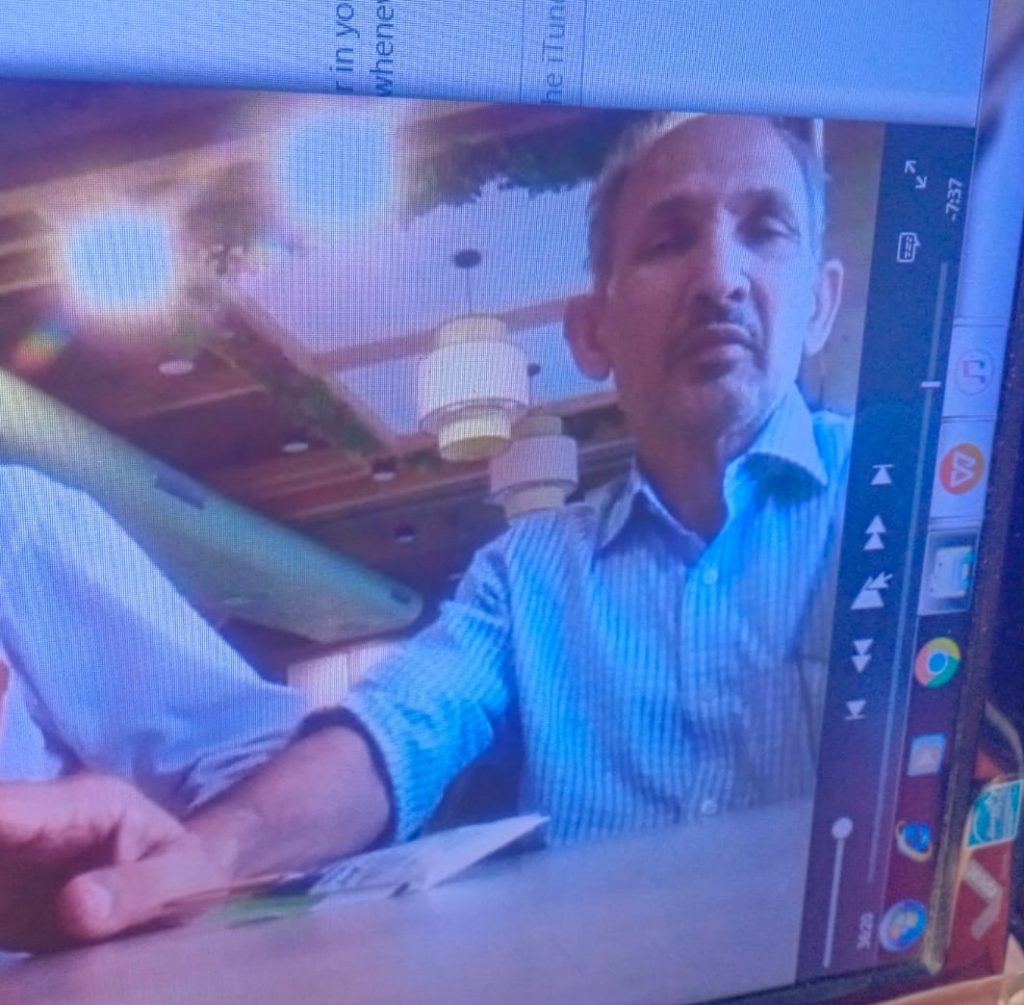
We asked Sanjay what would happen if he failed to prove me as a slum resident and whether I would lose the money invested in the flat. He reassured us by saying that government officials act carefully, so such a situation would not arise. He told us that losing the money was highly unlikely due to the involvement of the officials
Reporter- Nahi ho paya sabit to paise doob gaye na?
Sanjay- Matlab hi nahi hota sir,…sir sarkari adhikari jo hota hai na, koi bhi kadam uthata hai usmein char baar pehle sochta hai, theek hai sir?
[The conversation reveals the brokers’ ability to manipulate the system, as they are confident that government officials act cautiously and would not jeopardise the fraudulent scheme.]
Sanjay then revealed details about the “Red Paper.” According to him, this document, issued by the government, is crucial as it proves eligibility for a flat in the society. He assured us that we would definitely receive the flat, as they were only selling units to select individuals.
Sanjay- Ek baar koi pen chal gaya na sarkari afsar ka to kaam hona hi hona hai, nahi ho aisa ho nahi sakta pehli baat,..doosri baat jo lal wala paper aapke pass aa gaya na sir..
Reporter- Lal wala..?
Sanjay- Red paper ek tarah se card hai, ismein photo bhi hota hai bande ka, government ka mohar bhi hota hai. XXX ka paper hota hai..ye paper aa gaya na jab aapke pass to kisi ka ho ya na ho aapka zaroor hoga…kyunki jo bhi karwa raha hai na usko darr hai, kal ko mera naam kharab ho sakta hai.
Sanjay (continues)- Mein to itna hi tasaali kara sakta hoon ki aapka kaam 100 percent hoga ismein do rai nahi hai. Kyunki hum log zyada logon ko bechey nahi hain, kuch khas logon ko diya hai.
[The conversation highlights the importance of the “Red Paper,” a government-issued document with a photo and official seal that guarantees eligibility for the flat. Sanjay sounds confident the flat will be secured.]
Sanjay now went into detail about the “Red Paper.” According to him, it is issued by the authorities and indicates that the bearer was a slum resident before 2005. Based on this, the bearer is eligible for a flat meant for slum dwellers. Sanjay claimed that the value of the Red Paper is Rs 35 lakh, assuring that if the flat is not secured, Rs 35 lakh would be refunded. [Tehelka cannot independently verify the authenticity of this document.]
Sanjay- Sir, Red paper jo hai na wo 2005 ke back date se dikhayega ki aapke wahan sab kuch they…wo 35 lakh ka paper hai agar nahi hua to..
Reporter- Wo kahan dikhayega sampatti hamari?
Sanjay- Slum mein, usi se..aur us paper ki value sarkar ki nazar mein 35 lakh hai, agar maan ke chalo sab ko allot ho gaya aur aapka nahi hua. Lal paper aapke pass hai, aap chale jao lene.. ya to 35 lakh return karegi sarkar ya to jahan par flat hoga allot karenge…mukar nahi saktey.
[Sanjay elaborated that the “Red Paper” confirms slum residency from before 2005 and is valued at Rs 35 lakh. He claimed that if the flat is not secured, either Rs 35 lakh will be refunded or the flat will be guaranteed.]
Sanjay assured that if the flat is acquired and an investigation arises, no issues would occur. He explained that once the government issues the flat in one’s name, they won’t investigate further. Additionally, both Sanjay and Alvi confessed that they had indeed taken Rs 3 lakh in advance as a bribe from Ali Jaan.
Reporter- Ek baat batao hamne.. ye flat le liya, kal ko koi jaanch beth gayi..sawal uth gaya?
Sanjay- Sir koi sawal nahi uthega.
Reporter- 25-30 flat jo hain, wo kaise un logon ko bik gaye..paise wale logon ko.?
Sanjay- Aisa kuch nahi hoga sir.. government ek baar issue kar degi na aapke naam, poochney nahi aayegi ki aap kya kar rahe ho usmein…kyunki wo aap ko de rahi hai..5 saal tak maintainence free rahega aapka government ki taraf se.
Reporter- Aap batao aapne cash kitna liya Ali sahib se?
Alvi- 3 lakh liya
Reporter- Poora 3 lakh liya?
Alvi- Nahi 2 lakh liya.
Reporter- 2 lakh online, 1 lakh cash. Waise is mamle mein koi online deta nahi hai.
Sanjay- Aapas ki baat hai isliye liya.
Reporter- Dekho agar 3 lakh aapne inse liya hai, theek hai.. agar kuch kagaz patri aapne de di hoti, inhe ek bharosa sa ho jata.
Sanjay- Sir us paise ka to documentation ho gaya, ab jo jayega mein itna guarantee kar sakta hoon, ki aap sirf 4 lakh rupiya online kartey ho, sirf 4 lakh online mein dilwa dunga.
[Sanjay guaranteed that no issues would arise from an investigation once the flat is issued even as he stressed that maintenance would be free for five years.]
Alvi and Sanjay now told our reporter that they are taking Rs 6.50 lakh as a bribe money for one flat. Ali has booked two flats, so he has to pay total Rs 13 lakh. But he has only paid Rs 3 lakh, so they had demanded Rs 10 lakh more from Ali.
Reporter- To ismein hame kya karna hai, ye bataiye ?
Sanjay- Payment chahiye.. inka kaam ho jayega.
Reporter- Abhi tak kitna payment ja chukka hai. ?
Sanjay- Inka payment 2 chala gaya hai, ab poora payment dengey to.
Reporter- Kitna chala gaya hai.?
Ali- 3 lakh chala gaya mera.
Reporter- Total aap kitna le rahe hain inse ek flat ka..?
Sanjay- Sadhe cheh (6.50) ke hisab se bataya aapko
Reporter- Sadhe cheh..
Reporter- Matlab total inko 13 lakh dena hai 2 apartments ka.?
Sanjay- Haan..
Reporter- 3 ja chukka hai ..10 bachta hai..
Ali Jaan, who has booked two flats, needs to pay a total of Rs 13 lakh but has only paid Rs 3 lakh so far. He is told by the brokers that he has to make full payment to secure the flats.]
When asked about the benefits of investing Rs 13 lakh for two flats on behalf of Ali, Sanjay assured us each flat could later be sold for Rs 15 lakh, generating a substantial profit. This implies that investing now could lead to significant future gains.
Reporter- Maan lijiye mein inki taraf se baki ka 10 lakh rupiya de doon..mera usme kya fayda hai..?
Sanjay- Ji..aapka kya fayda , ye aap inse poochiye..
Reporter- Ye to ye kahengey aap usko zyada paiso mein bech dijiye…
Sanjay- Bik hi jayega..wo zyada mein bik jayega..2-3 mahine ruk kar agar 15 mein bhi bechogey to bik jayega..
Reporter- Dono 15 mein ?
Sanjay- Nahi ek hi 15 lakh mein..
[Sanjay explained that investing Rs 10 lakh for two flats was profitable proposition as each flat could be resold for Rs 15 lakh in a few months from now. It is clear that the brokers are prepared with speculative figures to convince potential buyers.]
Now, Sanjay insisted on receiving Rs 10 lakh in cash and refused to accept payment by cheque. He clarified that the entire amount must be paid in a single transaction, highlighting his strict preference for cash over other payment methods.
Reporter- 10 lakh ka aap payment logey to kaise logey instalment par ya one time.
Sanjay- One time
Reporter- Poore 10 lakh ..cash.?
Sanjay- Haan.
Reporter- Cheque nahi chalega
Sanjay- Nahi sir, cheque nahi chalega..
[The conversation underscores Sanjay’s preference for cash and the straightforward nature of the deal, with the objective of leaving no trace or record.]
[At this point, Alvi remarked that although these activities are illegal, they are often carried out in an honest and transparent manner. Sanjay added that the flats are being sold with the assistance of certain government officials, without whom they wouldn’t be able to complete the transactions.]
Alvi- Ek baat maine bhi kehni hai aapse..ye jo 2 number ka kaam hai ye badi imaandari se hota hai..
Reporter- Nahi.. imaandari se hota hai.. lekin kai baar 2 number mein bhi beimani ho jaati hai..
Sanjay- Nahi …ek baat jaantey hain, har vyakti ko apni naukri ka darr hota hai..
Reporter- To aapki to kisi ki naukri nahi hai..?
Alvi- Hamari kisi ki nahi hai magar jinke liye hum kaam kara rahe hain unki to hai..
Reporter- XXXX walon ki.?.
Sanjay- Obviously, sir.
Reporter- Ye XXXX ne banwaya hai.?
Sanjay- Unke involvement ke begair hum kaise kara saktey hain.
[Alvi noted that even illegal activities are carried out with a veneer of legality, while Sanjay emphasised that the sale of the flats is dependent on the involvement of certain government officials. The implication is that these officials’ support is crucial for the transactions.]
Now, Alvi disclosed that he had sold 10 flats in the same society. To verify the brokers’ claims, we asked Sanjay to introduce us to other clients who had received their flat allotment letters. In response, Sanjay introduced us to Mohammad Jameel at a subsequent meeting, claiming that Jameel had paid the full amount of Rs 6.50 lakh for one flat but was still awaiting its delivery.
Reporter- Kitne flat aise aapne dilwa diye?
Alvi- Mere khayal mein dus ek karwa diye.
Sanjay- Mein jameel bhai ko direct milwa dunga aapko, uska ‘lal paper’ bhi dekh saktey hain aap..aur inka bhi lal paper aa jayega, Jameel bhai ka aur inka sabka ekattha aayega, flat ekatha aayega.
Reporter- Jameel bhai ka nahi aaya abhi.?
Sanjay-Paper aa jayega, flat nahi mila..
Reporter- Un se kitna paisa liya?
Sanjay- Unse poora paisa ho gaya.
Reporter—Ek hi liya hai ?
Sanjay- Kya cheez ?
Reporter- Ek hi flat liya hai. Paisa kitna?
Sanjay- Sadhe 6 (6.5 lakh).
Reporter- Sadhe 6 poora.
[Alvi claimed to have facilitated the sale of 10 flats in the society. Sanjay introduced us to Mohammad Jameel, who had paid Rs 6.50 lakh for a flat but had yet to receive it. Sanjay confirmed that Jameel had paid the full amount for one flat but was still waiting to take possession. This highlights discrepancies between payment and the actual delivery of flats]
Sanjay now admitted to fraudulently listing Mohammad Jameel as a slum resident to secure a flat for him. He further revealed that Jameel had acquired another flat under the PM Awas scheme, despite not residing in a slum. This underscores the manipulation of residency requirements to obtain flat.
Reporter- Ek ismein aur le liya hai unhoney PM Awas mein.
Sanjay- Haan ek aur leliya hai..
Reporter- Jhuggi mein nahi rehtey wo?
Sanjay- Jhuggi mein kahan rahenge wo?
[Sanjay’s admission highlights that Mohammad Jameel, who was fraudulently listed as a slum resident for one flat, also secured another flat under the PM Awas scheme despite not actually living in a slum. This highlights how unscrupulous elements are blatantly exploiting the residency criteria.]
Sanjay now reveals that the flats are not officially for sale; rather, government officials are holding 25-30 flats and selling them through selected intermediaries. He stated that significant amounts of money are being distributed as bribes throughout the official hierarchy, with only a few flats remaining. This suggests a network of corruption and financial manipulation surrounding these flats.
Reporter- Accha sarkari paisa usmein 1.47 hai..?
Sanjay- Rs 1.47 lakh ki deed jaati hai, aur dedh lakh.. Rs 1.50 aise hi log letey hain..uska letey hain jiska zameen ho.
Reporter- Ye kin kin logon mein jata hai paisa ?
Sanjay- Ye uper se neeche tak jata hai….inke pass 15-20 flat bache hain, zyada nahi hain, aur wahi sab wo payment online karwa denge saara.
Reporter- Hum jaise aur bhi log hain lene wale.
Sanjay- Nahi sir, ye bechne ke liye nahi hain.
Reporter- Bechne ke liye to nahi hain par phir bhi beche jaa rahe hain na..
Sanjay- Sarkari aadmi ke haath mein 25-30 flat tha.
Reporter- Accha 25-30 the.. sab nahi hain.?
Sanjay- Jismein se kareeban 5-6 nikal gaye hain..23-24 aur bache hue hain..theek hai na….wo jaise hi niklenge usi ka paisa khayenge ye log.
[Sanjay detailed about prevalent corruption, with transactions of around Rs 1.50 lakh. He confirmed that these flats are not available for general sale, illustrating ongoing financial manipulation and selective allocation.]
Ali Jaan, after paying an initial bribe, soon realised he was being deceived by the two middlemen. Consequently, he withheld further payments and received neither the “red letter” nor the flat he was promised. Meanwhile, Mohammad Jameel, who claimed to have paid the full amount for his flat, received only a red letter and no actual flat. Jameel admitted that he had never lived in a slum, yet the red letter he obtained after paying the bribe falsely indicated a survey number showing he had resided in a slum before 2005. Sanjay Kumar Pandit and Moinuddin Alvi, the two middlemen, continue to operate, defrauding people by selling flats intended for slum dwellers to wealthy individuals.
It is time for the Delhi Development Authority (DDA) to intervene and address the alleged issues of corruption surrounding the Kalkaji Extension project for rehabilitating slum dwellers. This intervention is necessary to prevent further exploitation and ensure justice for those affected. The ongoing problems highlight the urgent need for stringent regulatory oversight and accountability in the housing sector.



